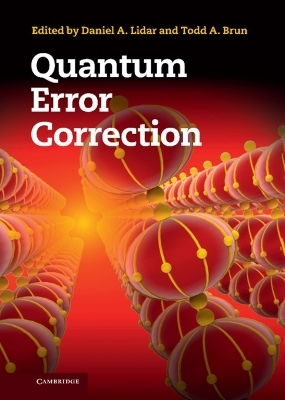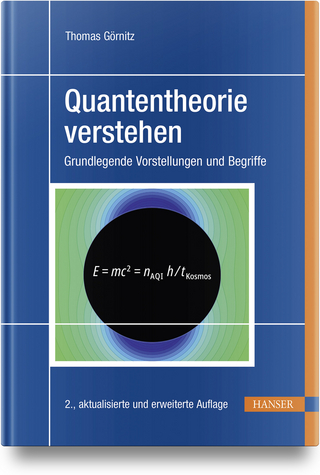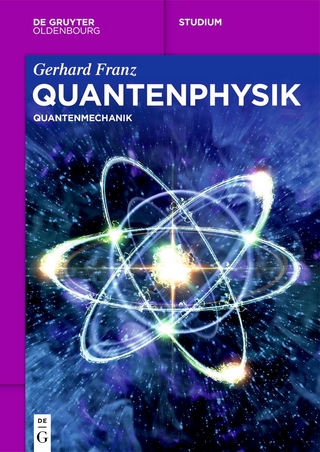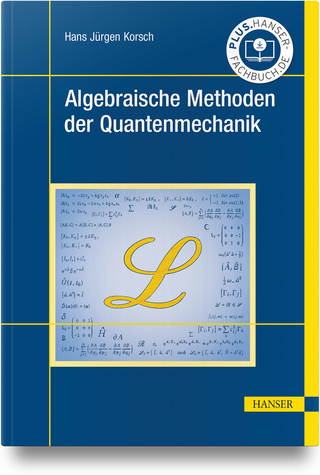
Quantum Error Correction
Cambridge University Press (Verlag)
978-0-521-89787-7 (ISBN)
Quantum computation and information is one of the most exciting developments in science and technology of the last twenty years. To achieve large scale quantum computers and communication networks it is essential not only to overcome noise in stored quantum information, but also in general faulty quantum operations. Scalable quantum computers require a far-reaching theory of fault-tolerant quantum computation. This comprehensive text, written by leading experts in the field, focuses on quantum error correction and thoroughly covers the theory as well as experimental and practical issues. The book is not limited to a single approach, but reviews many different methods to control quantum errors, including topological codes, dynamical decoupling and decoherence-free subspaces. Basic subjects as well as advanced theory and a survey of topics from cutting-edge research make this book invaluable both as a pedagogical introduction at the graduate level and as a reference for experts in quantum information science.
Daniel A. Lidar is a Professor of Electrical Engineering, Chemistry and Physics at the University of Southern California, and directs the USC Center for Quantum Information Science and Technology. He has worked on quantum control theory for the past 15 years and is well known for his contributions to quantum error correction, in particular the development of decoherence-free subspaces. Todd A. Brun is an Associate Professor of Electrical Engineering, Physics and Computer Science at the University of Southern California. He has worked in the field of quantum information science for nearly 20 years, and has made many influential contributions to quantum error correction, where he is especially known for his work on entanglement-assisted codes.
Prologue; Preface; Part I. Background: 1. Introduction to decoherence and noise in open quantum systems Daniel Lidar and Todd Brun; 2. Introduction to quantum error correction Dave Bacon; 3. Introduction to decoherence-free subspaces and noiseless subsystems Daniel Lidar; 4. Introduction to quantum dynamical decoupling Lorenza Viola; 5. Introduction to quantum fault tolerance Panos Aliferis; Part II. Generalized Approaches to Quantum Error Correction: 6. Operator quantum error correction David Kribs and David Poulin; 7. Entanglement-assisted quantum error-correcting codes Todd Brun and Min-Hsiu Hsieh; 8. Continuous-time quantum error correction Ognyan Oreshkov; Part III. Advanced Quantum Codes: 9. Quantum convolutional codes Mark Wilde; 10. Non-additive quantum codes Markus Grassl and Martin Rötteler; 11. Iterative quantum coding systems David Poulin; 12. Algebraic quantum coding theory Andreas Klappenecker; 13. Optimization-based quantum error correction Andrew Fletcher; Part IV. Advanced Dynamical Decoupling: 14. High order dynamical decoupling Zhen-Yu Wang and Ren-Bao Liu; 15. Combinatorial approaches to dynamical decoupling Martin Rötteler and Pawel Wocjan; Part V. Alternative Quantum Computation Approaches: 16. Holonomic quantum computation Paolo Zanardi; 17. Fault tolerance for holonomic quantum computation Ognyan Oreshkov, Todd Brun and Daniel Lidar; 18. Fault tolerant measurement-based quantum computing Debbie Leung; Part VI. Topological Methods: 19. Topological codes Héctor Bombín; 20. Fault tolerant topological cluster state quantum computing Austin Fowler and Kovid Goyal; Part VII. Applications and Implementations: 21. Experimental quantum error correction Dave Bacon; 22. Experimental dynamical decoupling Lorenza Viola; 23. Architectures Jacob Taylor; 24. Error correction in quantum communication Mark Wilde; Part VIII. Critical Evaluation of Fault Tolerance: 25. Hamiltonian methods in QEC and fault tolerance Eduardo Novais, Eduardo Mucciolo and Harold Baranger; 26. Critique of fault-tolerant quantum information processing Robert Alicki; References; Index.
| Erscheint lt. Verlag | 12.9.2013 |
|---|---|
| Zusatzinfo | 6 Tables, black and white; 141 Line drawings, unspecified |
| Verlagsort | Cambridge |
| Sprache | englisch |
| Maße | 178 x 252 mm |
| Gewicht | 1350 g |
| Themenwelt | Naturwissenschaften ► Physik / Astronomie ► Quantenphysik |
| ISBN-10 | 0-521-89787-4 / 0521897874 |
| ISBN-13 | 978-0-521-89787-7 / 9780521897877 |
| Zustand | Neuware |
| Haben Sie eine Frage zum Produkt? |
aus dem Bereich


